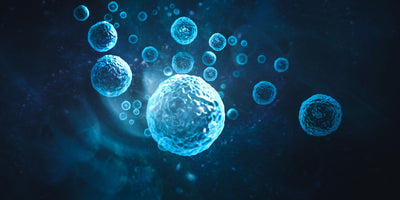Astaxanthin Supplements: A Beacon for Age-Related Health Concerns
Astaxanthin, a carotenoid packed with antioxidative prowess, is carving a niche in the realm of natural supplements, particularly when addressing age-related health challenges.
Chemical Structure and Natural Sources of Astaxanthin
Astaxanthin’s distinct position in the carotenoid family can be attributed to its unique chemical structure, which enables it to effectively combat oxidative stress. Unlike many of its carotenoid counterparts, astaxanthin has the ability to span cell membranes, offering protection both inside and outside of cells.
Haematococcus pluvialis, a microalga, is the primary natural reservoir of this powerful antioxidant. When organisms like crustaceans and certain fish consume this alga, they adopt a pinkish-red colour, a direct result of astaxanthin's influence. This is how salmon, for instance, gets its iconic hue.
However, not all astaxanthin products on the market are derived naturally. Synthetic versions, produced through chemical synthesis, do exist. But there's a catch: the natural form is often cited as having superior antioxidant properties compared to its synthetic counterpart. This superiority, however, usually comes with a steeper price point, posing a challenge for consumers when choosing between cost and quality.
Astaxanthin and Skin Health
Counteracting Photoaging: The sun, whilst essential for life, also poses a formidable threat to skin health. UV-induced photoaging is a consequence of prolonged exposure. Astaxanthin intervenes at a cellular level, neutralising the harmful free radicals produced due to UV rays. This can lead to visible benefits: reduction of wrinkles, enhanced moisture retention, and an improvement in skin elasticity.
However, the journey to radiant, healthy skin isn't a one-supplement affair. While astaxanthin plays a substantial role, it's most effective when integrated into a broader skincare routine, one that includes sun protection, hydration, and other nourishing ingredients.
Research also indicates the potential for astaxanthin to protect the skin against other external aggressors beyond UV rays, like pollution. Yet, it's essential to remember that while astaxanthin is a potent ally in skincare, individual results may vary, necessitating a patient and holistic approach to skin health.
Neuroprotective Effects of Astaxanthin
With an ageing global population, neurodegenerative diseases like Alzheimer’s and Parkinson’s are of paramount concern. Oxidative stress is a shared culprit in many of these conditions. Astaxanthin's antioxidative properties, therefore, position it as a potential neuroprotective agent.
Preliminary studies, particularly in animal models, have showcased promising results. Astaxanthin appears to not only prevent neuronal damage but may also boost cognitive function. But while these findings are indeed optimistic, the realm of human trials is still in the early stages. More comprehensive, long-term research is required before astaxanthin can be widely advocated as a preventive or therapeutic solution for neurodegenerative diseases.
Yet, even as research continues, there's no denying the potential astaxanthin holds in this arena. For those seeking a natural supplement to incorporate into a brain health regimen, astaxanthin might be worth considering, albeit with realistic expectations.
Cardioprotective Benefits of Astaxanthin Supplements
Cardiovascular diseases continue to be a dominant cause of mortality worldwide. Oxidative stress plays a part, exacerbating these conditions. Astaxanthin, with its potent antioxidative properties, seems poised to offer cardioprotective benefits.
Studies have suggested that astaxanthin might reduce lipid peroxidation, a process that can lead to atherosclerosis. Additionally, potential benefits include blood pressure reduction and improved arterial blood flow, which are critical factors in overall heart health.
However, whilst the early results are encouraging, it's crucial to integrate astaxanthin into a comprehensive heart health plan. This means not only considering supplementation but also adhering to a balanced diet, engaging in regular exercise, and undergoing periodic medical evaluations.
The heart, with its intricate mechanisms and vital role, requires a multifaceted approach to its care. Astaxanthin, whilst potent, is just one piece of a larger cardiovascular health puzzle.
Ocular Health: Astaxanthin and Age-Related Macular Degeneration (AMD)
The eyes, our windows to the world, are susceptible to the ravages of time and environmental factors. AMD is a primary concern, especially amongst the elderly, and is influenced by oxidative stress.
Astaxanthin's ability to combat oxidative stress, coupled with its tendency to concentrate within the retina, hints at its potential preventive role against conditions like AMD. Some studies have shown that individuals supplementing with astaxanthin experienced reduced eye strain and improved visual acuity.
Yet, whilst its preventive attributes are promising, they shouldn't negate the importance of regular eye care. This includes periodic eye exams, wearing UV-protective sunglasses, and ensuring a diet rich in other eye-friendly nutrients like lutein and zeaxanthin.
In the broader context of ocular health, astaxanthin can be seen as a supplementary shield, bolstering the eyes' defences but not replacing traditional eye care measures.
Astaxanthin's Role in Joint Health and Arthritis
Joint health deteriorates with age, leading to conditions like arthritis, often characterised by inflammation. Here, astaxanthin, known for its anti-inflammatory properties, may offer relief.
By curbing inflammation at a cellular level, astaxanthin might alleviate symptoms associated with arthritic conditions. This isn't just theoretical—some studies have indicated reduced pain and improved mobility in arthritis patients supplementing with astaxanthin.
However, the extent of relief can vary among individuals. This underscores the importance of a comprehensive approach to joint health, one that combines astaxanthin supplementation with other treatments, physical therapy, and lifestyle adjustments.
In essence, while astaxanthin holds potential in the world of joint health, it should ideally be considered as a component within a broader therapeutic strategy, rather than a singular solution.
Mitigating Exercise-Induced Muscle Damage with Astaxanthin
![]()
Every fitness enthusiast knows the double-edged sword of exercise: whilst beneficial, it can also lead to muscle damage, especially after intensive sessions. Astaxanthin emerges as a potential ally in this domain.
Studies have shown that astaxanthin can reduce muscle damage, aid in faster recovery, and decrease post-exercise soreness. Its anti-inflammatory and antioxidative properties play a role here, safeguarding muscles against the oxidative stress that often follows intense workouts.
However, relying solely on astaxanthin for post-workout recovery might be limiting. It's best utilised in conjunction with other recovery strategies, such as adequate rest, hydration, and balanced nutrition.
Fitness, with its multifaceted requirements, necessitates a comprehensive approach. While astaxanthin undoubtedly holds promise in the realm of exercise recovery, it works best as part of a holistic strategy to ensure optimal muscle health and performance.
Astaxanthin and Immune System Modulation
The immune system, our body's defence mechanism, is influenced by a myriad of factors, and maintaining its balance is crucial for overall health. Astaxanthin, with its anti-inflammatory and antioxidant properties, appears to play a role in immune modulation.
Studies have indicated that astaxanthin can inhibit the proliferation of certain harmful cells and promote the proliferation of beneficial immune cells, thereby contributing to a balanced and effective immune response.
However, it's essential to understand that the immune system is an intricate network. While astaxanthin offers encouraging benefits, relying solely on it may be an oversimplified approach. A mix of nutrients, adequate rest, stress management, and good hygiene are fundamental pillars of immune health.
Moreover, immune system modulation isn't a one-size-fits-all scenario. Factors such as genetics, age, existing health conditions, and environmental influences all play a role. Hence, while astaxanthin can be an invaluable tool in the immune-support toolkit, it should be amalgamated with other strategies and, where appropriate, under the guidance of healthcare professionals.
Bioavailability and Dosage Recommendations for Astaxanthin Supplements
The benefits of any supplement are intricately tied to its bioavailability — how efficiently it's absorbed and utilised by the body. Astaxanthin's bioavailability can be influenced by various elements, including dietary fat, which enhances its absorption.
Typically, a daily dosage of astaxanthin ranges from 4-12mg. However, this isn't a blanket recommendation. Individual requirements, body weight, and specific health concerns may necessitate adjustments in this range. It's always prudent to begin with a lower dose, observing any changes or benefits before opting for a higher dosage.
Moreover, the origin of astaxanthin matters. As mentioned previously, natural astaxanthin, primarily derived from Haematococcus pluvialis, is often deemed superior in its antioxidant capacity compared to its synthetic equivalents. Consumers should be discerning, examining product labels and choosing reputable brands to ensure maximum benefit from their supplement.
In all matters of supplementation, including astaxanthin, consulting with a healthcare professional is advisable. Such consultations ensure that the supplement doesn't adversely interact with other medications or existing health conditions.
Safety and Side Effects: Is Astaxanthin Safe for Long-Term Use?
An essential facet of any supplement's utility is its safety profile. By and large, astaxanthin is deemed safe for most individuals when consumed within recommended doses. Short-term usage has demonstrated minimal side effects, with minor changes in skin pigmentation and occasional gastrointestinal discomfort being the most reported.
However, its long-term safety profile warrants further research. Although no significant adverse effects have been associated with prolonged use, the complete spectrum of its effects over extended periods remains under investigation.
While astaxanthin does possess anti-inflammatory properties, excessive intake could, theoretically, suppress essential inflammatory responses within the body. This highlights the importance of moderation and adherence to recommended dosages.
In sum, astaxanthin is increasingly recognised as a powerful natural supplement, especially in the context of age-related health concerns. However, it's paramount to approach its use with informed discretion. Like all supplements, it's best when part of a broader health regimen, encompassing a balanced diet, regular exercise, and periodic consultations with healthcare professionals. In doing so, one can fully harness the potential of astaxanthin, promoting optimal health and well-being.
Summary
Chemical Structure and Natural Sources of Astaxanthin- Astaxanthin's unique structure allows it to fight oxidative stress effectively. It spans cell membranes, protecting cells inside and out.
- Haematococcus pluvialis, a microalga, is astaxanthin's main natural source. Synthetic versions exist but are less effective than natural forms, which are more expensive.
- Astaxanthin combats UV-induced photoaging, reducing wrinkles and improving skin elasticity. It neutralises harmful free radicals.
- Effective in skincare, astaxanthin should be part of a wider routine including sun protection. Results vary individually.
- Astaxanthin may protect against neurodegenerative diseases by reducing oxidative stress. It shows potential in preventing neuronal damage and enhancing cognition.
- Promising in animal studies, more human research is needed. It's a potential supplement for brain health.
- Astaxanthin may reduce lipid peroxidation and improve heart health. It could lower blood pressure and enhance blood flow.
- It should complement a heart health plan with diet, exercise, and medical checks. Astaxanthin is part of a larger cardiovascular strategy.
- Astaxanthin may help prevent AMD by fighting oxidative stress. It's shown to reduce eye strain and improve vision.
- Regular eye care remains essential. Astaxanthin is a supplementary measure, not a replacement for traditional eye care.
- Astaxanthin's anti-inflammatory properties may relieve arthritis symptoms. It can reduce inflammation and improve joint mobility.
- Effectiveness varies among individuals. It should be part of a broader joint health strategy, not a standalone treatment.
- Astaxanthin helps reduce muscle damage and aids recovery after exercise. It decreases post-exercise soreness.
- Best used with other recovery methods like rest and nutrition. Astaxanthin is part of a holistic approach to muscle health.
- Astaxanthin may balance the immune response by affecting immune cells. It has anti-inflammatory and antioxidant effects.
- It should be used with a mix of nutrients and lifestyle practices. Astaxanthin is one part of a comprehensive immune strategy.
- Astaxanthin's absorption is enhanced by dietary fat. Dosages typically range from 4-12mg daily, but needs vary.
- Natural astaxanthin is superior to synthetic forms. Choose reputable brands and consult healthcare professionals for dosage advice.
- Generally safe within recommended doses, astaxanthin's long-term effects need more study. Minor side effects include skin changes and stomach discomfort.
- Excessive intake could suppress necessary inflammation. Use in moderation and follow dosage guidelines. Astaxanthin is best as part of a balanced health regimen.









